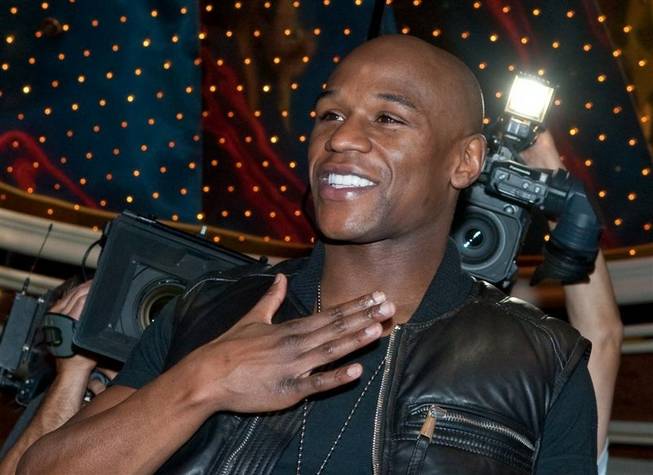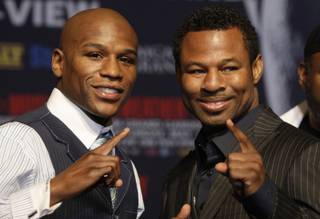
Tom Donoghue/www.donoghuephotography.com
Floyd Mayweather Jr. arrives at the MGM Grand on April 27, 2010.
Wednesday, April 28, 2010 | 8:40 p.m.
Mayweather vs Mosley: Prefight Presser
Both the Mayweather and Mosley camps get in a few last jabs and jokes before Saturday's fight.
Reader poll
Sun Archives
Floyd Mayweather Jr. already believes he should go down as the greatest boxer of all time.
He'd also like to be remembered as one of the key contributors in wiping performance-enhancing drugs from the sport.
Mayweather has told his fans, the media and those that represent him at Golden Boy Promotions that he will not agree to face any fighter who will not submit himself to random blood testing. The current drug policy of the Nevada State Athletic Commission requires fighters to undergo urine tests.
The reason for this demand, Mayweather says, is that performance-enhancing drugs are too prevalent in the sport and put fighters' health at risk.
"You start seeing so many different fighters, over and over again, go into comas," Mayweather said. "Fighters are dying. From what I hear, enhancement drugs are making fighters punch harder, faster and stronger. All it's doing is hurting the sport."
At Mayweather's request, both he and Shane Mosley agreed to voluntarily undergo Olympic-style blood testing leading up to their welterweight bout Saturday at the MGM Grand Garden Arena.
Because of the magnitude of the event and the athletes themselves, Mayweather's team believes it could be a major step forward in persuading athletic commissions to adopt blood testing as their own policy.
"It's a big statement that takes it to the forefront," said Golden Boy CEO Richard Schafer. "It is those kinds of events that can act as a trigger for change. And I hope it will be a trigger. Who knows? Maybe five years from now we'll look back and say the trigger to all this was the Mayweather-Mosley fight."
According to NSAC executive director Keith Kizer, a change to the commission's drug policy will likely occur well within the next five years.
The NSAC has been at the head of many rule changes to discourage drug use said Kizer, including switching wins to "no contests" when a fighter tests positive for banned substances.
According to Kizer, the last significant meeting it held on drug-testing policies was in September 2008, when it was determined that urine testing was the most effective, accurate method.
However, the process of blood testing has been improved since then — including the first positive test for HGH by a British professional rugby player in February this year.
Those advancements have fell under the NSAC's consideration, and Kizer said the commission likely would revisit its drug-testing policy as early as next month.
"It's never not been under our consideration, it's an ongoing thing," Kizer said. "Urine testing is better for testing everything except HGH. Blood testing, until recently, hasn't been perfected.
"We held a public meeting in 2008 where we looked over a lot of material. Now, it's 18 months later and we need to revisit it. It could be expanding our urine testing or adding blood testing. Something could happen, hopefully, next month."
Members from Mayweather's camp believe the greatest contribution the fighter can make to the process is continuing to demand random blood tests of all his opponents.
According to HBO officials, Mayweather fights generate an average of $48.6 million in pay-per-view revenue — the most of any fighter in boxing history.
Any potential opponent looking to cash in on that type of financial opportunity will have to be willing to go above and beyond the drug-testing requirements of athletic commissions.
"He leads by example," said Leonard Ellerbe, Mayweather's advisor. "He's standing up and saying, 'Look, this is what I'm doing and if anybody wants to fight me, this is what they are subjected to.'"
Fans and media alike have questioned the timing of Mayweather's decision to take such a stand, as it was the reason negotiations fell through for a super-fight with Filipino welterweight Manny Pacquiao.
Some have suggested that Mayweather made the demands only because Pacquiao has the reputation of being fearful of needles.
However Ellerbe maintains that cleaning the sport of drugs has been a discussion of Mayweather's camp long before negotiations with Pacquiao.
"Who says it wasn't important before?" said Ellerbe. "Things we talk about internally we don't always talk about in public. The time was right. Why not now? If something is important for the health and safety of fighters, then why no question it."
To Mayweather himself, the issue is even simpler than "the right timing" or the policies of athletic commissions.
He considers himself the greatest in the sport and says he didn't use any performance-enhancing drugs to become the greatest.
He's proud of that — and believes any other clean fighter would be, too.
"I don't understand. Just take the test," Mayweather said. "If none of these fighters are doing nothing, then just take the test. If you're a clean fighter, then take the test."
Brett Okamoto can be reached at 948-7817 or [email protected].


Join the Discussion:
Check this out for a full explanation of our conversion to the LiveFyre commenting system and instructions on how to sign up for an account.
Full comments policy